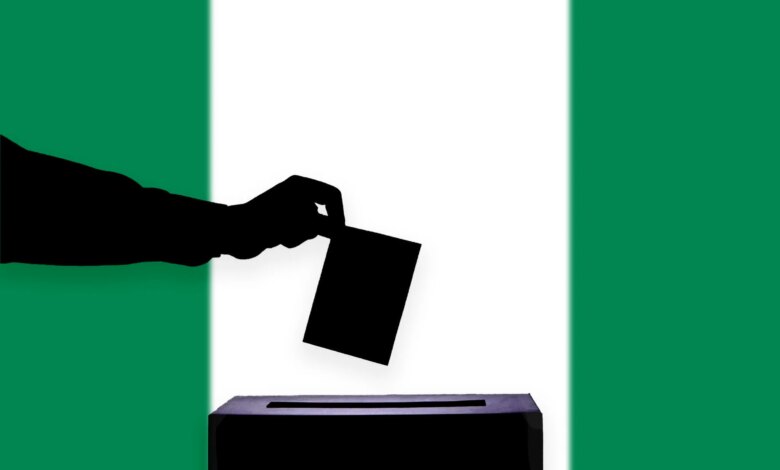2027: Concern mounts in Nigeria over early election campaigns

Almost two years to the next presidential election in Nigeria, there is heightened political activity across the country.
This is as individuals and political parties are seen already campaigning in violation of the Electoral Act which explicitly stated that campaigns of any kind are not allowed until 150 days before the election.
Many Nigerians are worried that political leaders have abandoned governance and channeled all their energies to campaigns ahead of the 2027 election.
To make matters worse, the electoral body, the Independent National Electoral Commission, INEC, charged with the constitutional responsibility to regulate the activities of political parties in this regard is not doing anything.
The same thing applies to the police, whose constitutional mandate includes to arrest and prosecute those who break the laws of the land- the police are also looking away from the impunity.
The INEC chairman, Prof Mahmood Yakubu, had last week, raised the alarm that political parties have already kicked off subtle campaigns despite clear provisions that restricted such activities to 150 days before the election.
Speaking at a one-day stakeholders’ roundtable on the challenges of early political campaigns, at the Electoral Institute in Abuja, Yakubu had highlighted what he described as a “disturbing trend” of political campaigning ahead of scheduled timelines, especially in relation to upcoming off-cycle governorship elections, the Federal Capital Territory Area Council elections, and the 2027 general elections.
He cited Section 94(1) of the Electoral Act 2022, which clearly prohibits the commencement of campaigns earlier than 150 days before polling day, and which also requires all campaign activities to end 24 hours before voting begins.
However, he lamented that political actors often disregarded this provision. “Political parties, candidates and their supporters seem to be perpetually in election mood even when the electoral commission is yet to release the timetable and schedule of activities for elections.
“Around the country, we have seen outdoor advertising, media campaigns and even rallies promoting various political parties and candidates,” he said.
He, however, warned that these premature activities severely compromise the commission’s ability to enforce campaign finance limits, saying, “These actions and activities undermine the commission’s ability to track campaign finance limits as politicians, prospective candidates and third-party agents expend large amount of money that cannot be effectively monitored before the official commencement of campaigns.”
The development has drawn sharp reactions across the political space. What worries many Nigerians, particularly close political observers of political developments in Nigeria in the last two years, is the INEC chairman’s confession that the electoral umpire cannot do anything about the ugly trend.
Although Section 94(2) of the Electoral Act 2022 imposes a maximum fine of N500,000 for campaigning within 24 hours of an election, Professor Yakubu pointed out that there is no sanction whatsoever concerning breaches for campaigns earlier than 150 days to an election.
“This is where the Commission faces the challenge of dealing with early campaign,” he stated
He acknowledged that early campaigning is not a new issue, but stated that the failure of regulatory bodies to address it within existing legal constraints necessitated deeper reflection.
However, there is a belief in certain quarters that INEC, as well as the Police are not doing anything about the disturbing trend because the ruling All Progressives Congress, APC, is deeply involved.
Several individuals and organisations, including the main opposition political parties, have all raised concerns about the ugly trend, warning that unless urgent and drastic measures were taken to arrest the development, the 2027 election can as well be considered compromised already.
While calling for firm measures to curb the trend, the opposition Peoples Democratic Party, PDP, and the African Democratic Congress, ADC, accused the ruling APC of being the worst offender.
Expressing its concern, the Socio-Economic Rights and Accountability Project (SERAP) has not only called on Yakubu’s INEC to perform its constitutional duty by punishing early election campaigners but also threatened to file a legal action against INEC for refusing to carry out its constitutional responsibilities.
The body charged Yakubu to identify politicians and political parties blatantly violating constitutional and statutory legal provisions and international standards, which prohibit early election campaigns and ensure their prosecution and that of their sponsors.
It also urged him to closely monitor political parties going against this rule and to develop clear regulations to govern the conduct of parties and politicians regarding premature election campaigns in Nigeria.
This call was contained in SERAP’s letter dated September 13, and signed by the Deputy Director, Kolawole Oluwadare.
SERAP refused to accept that INEC is helpless, as it said: “INEC is not helpless when political parties, candidates and other politicians contravene the legally prescribed period for election campaigns. Early election campaigns are unconstitutional and illegal.
“INEC’s constitutional and statutory mandates extend to sanctioning or penalising electoral offences, including early election campaigns.
“INEC should not be seen to be encouraging or giving legitimacy to political parties, candidates and other politicians carrying out early election campaigns outside the legally prescribed campaign period.”
SERAP warned that early election campaigns have adverse effects on economic development of the country due to prolonged electioneering frenzy. The body lamented that those in leadership positions, particularly the state governors, are wasting public funds on such early campaigns to the detriment of the citizenry.
“As INEC is yet to publish the timetable and schedule of activities for the elections, early election campaigns are inconsistent and incompatible with the letter and spirit of the Nigerian Constitution 1999 [as amended], Electoral Act and the country’s international human rights obligations.
“Several state governors seem to be using fuel subsidy windfall for early election campaigns. Several state governors are grossly failing to invest in social and economic development and provide essential services to their residents despite a significant increase in revenue since the removal of fuel subsidies.
“Enforcing the prohibition against early election campaigns would be reasonable, justifiable and proportionate, as it would serve to achieve human dignity, equality, and freedom. INEC has broad constitutional and legal obligations to promote, protect and uphold the rule of law and defend the public interest,” it stated.
SERAP also expressed concern about the possibility of establishing a culture of impunity if the trend is allowed to persist. It said: “Any failure by INEC to fairly enforce constitutional and statutory prohibitions of early election campaigns and the country’s international human rights obligations would create a culture of impunity by perpetrators and their sponsors.
“By failing to act against or sanction political parties, candidates and other politicians for engaging in early election campaigns, INEC is implicitly condoning the violations of the Nigerian Constitution, the Electoral Act and the country’s international human rights obligations.
“We would, therefore, be grateful if the recommended measures are taken within seven days of the receipt and/or publication of this letter. If we have not heard from you by then, SERAP shall take all appropriate legal actions to compel you and INEC to comply with our request in the public interest.
“Rather than prioritising delivering good governance to their people, state governors and other politicians are hoisting campaign banners across the country soliciting votes.
“INEC can rely on section 83 of the Electoral Act to seek information or clarification from political parties on how they are complying with the constitutional prohibition of early election campaigns and to direct the parties to immediately end the practice which is clearly contrary to the Nigerian Constitution and the Electoral Act.
“INEC should impose sanctions on political parties and candidates who fail to comply with its directive, as prescribed under section 83(4) of the Nigerian Constitution.
“It should also use section 225 of the Nigerian Constitution to demand from political parties the source(s) of funding by the parties and candidates for early election campaigns.
“Several political parties, candidates and other politicians are promoting themselves and canvassing for votes before the 150 days prescribed by the Electoral Act. Political parties, candidates and other politicians cannot elevate themselves above the law.
“Early election campaigns undermine the provisions of chapters 2 and 4 of the Nigerian Constitution covering fundamental objectives and directive principles of state policy and fundamental rights.”
In his contribution, a former lawmaker in Katsina State, Yusuf Shehu, condemned the development and lambasted the electoral body for standing idly while politicians undermine the country’s electoral process.
He said: “The drafters of the Nigerian Constitution and the Electoral Act never contemplated that political season would be a continuous exercise. Public officers ought to comply with the constitutional Code of Conduct for Public Officers or face the legal consequences if they fail to do that.
“Several candidates and other elected public officials have abandoned their constitutional oath of office, including acting for the well-being and prosperity of Nigeria, and to preserve, protect and defend the Nigerian Constitution.
“Politicians, including several state governors, are prioritising election campaigns over achievements on socio-economic well-being of Nigerians, especially the marginalized and disadvantaged sectors of the population.
“Early election campaigns facilitate diversion of public resources and disruption of public services, as well as undermine citizens’ access to public goods and services, as they give unfair advantage to well-resourced or incumbent candidates, thus eroding transparency, fairness and impartiality.
“The failure to punish political parties, candidates and other politicians for engaging in early election campaigns would continue to allow elected officers to use public resources for political purposes. It would also compromise the neutrality of public offices, violate the principles of public service and create conflict of interests.”
Also in his submission, human rights lawyer, Femi Falana has equally asked the INEC to arraign those violating the rules against early election campaigns before the court to serve as deterrent to others.
Falana made the call during an appearance on Channels Television‘s Sunday Politics.
Although he agreed with the INEC boss that the constitution did not stipulate appropriate sanction, he said, “The law cannot cover all situations. The lawmakers thought they were dealing with a civilised political class. No.
“Now that they are violating the law, it makes it a duty, empowered by the Constitution and the Electoral Act, to bring out rules and regulations.
“By the way, INEC is required to charge some of these guys before the court. Let them come to court and say, ‘Sorry, my Lord, there is no provision for punishment.’
“If you fail to comply with the order of the court, you have committed contempt and you will go to jail.”
He further noted that the constitution empowers INEC to draft rules and regulations to cover such a lacuna, saying, “Section 95 empowers INEC to draft rules and regulations. In the Constitution, Paragraph F, Part 1 empowers INEC to monitor campaigns in line with its prescribed rules and regulations. So, INEC has not brought out rules and regulations to stop this illegality and it should do so at once.”
Even the former INEC chairman, Prof Attahiru Jega equally raised concern about the growing trend of premature election campaigns in Nigeria, warning that it posed grave dangers to the integrity of the 2027 elections if not urgently addressed.
Jega, who delivered a key address at a stakeholders’ roundtable organised by INEC to examine the challenges of premature campaigns last week in Abuja In his keynote, noted that campaigns conducted outside the legally prescribed period conferred unfair advantages on certain candidates, undermine the rule of law, heat up the polity and entrench a culture of impunity among political actors.
He blamed “matured democrats” for early campaigns and violations of election rules, even as he added that lawmakers were the major beneficiaries of early campaigns and, therefore, most unlikely to make laws to impose stiffer penalties on premature campaigners.
“Premature election campaigns are undesirable aberrations in democratic elections. They create an uneven playing field, disrespect the law, and may even generate political tension and conflict,” he warned.





